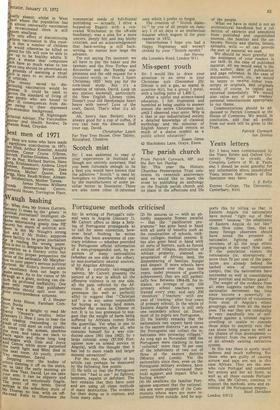Portuguese methods criticised
Sir: In writing of Portugal's colonial wars in Angola (January 1), Mr Calvert offers so large a helping of Portuguese propaganda as to call for some correction, however brief. Nothing he writes shows the least awareness of contrary evidence — whether provided by Portuguese official information of a non-propagandist sort, by reporters of many nationalities (whether on one side or the other), by non-journalistic neutral sources, or by Angolan Africans. With a curiously tail-wagging naivety, Mr Calvert presents the picture of a war in which all the offensive violence is on one side, all the pain inflicted by the Africans. It is, of course, perfectly grotesque (as well as perfectly silly) to suggest that " Christian aid" is in any sense responsible for buying or laying land mines, whether the mines be Chinese or not. It is no less grotesque to suggest that the weight of harm being suffered by Africans comes from the guerrillas. Yet what is one to make of a reporter, after all, who consoles himself for a war conducted since 1961 (not 1962), by '3 large colonial army (57,000 Portuguese now on armed service in Angola), with the thought that it has led to more roads and larger mineral extraction? For the rest, the quality of his article can perhaps be measured by the following few points: (1) He tells us that the Portuguese have not "had to use" jet fighters, bombers, napalm or defoliant. The fact remains that they have used and are using all these methods of mass destruction. The evidence for their doing so is copious, and from many sides. (2) He assures us — with an absurdly inapposite Roman parallel — that the " pacification programme" has gone hand in hand with all sorts of benefits such as the construction of schools, technical colleges, medical centres. It has also gone hand in hand with all sorts of horrors, such as forced eviction of villages, destruction of African property, planned expropriation of African land, the dismembering of families, hunger and despair. If more schools have been opened over the past few years, under pressure of guerrilla achievement, they are still pathetically few. Between 1964-69, for instance, an average of only 100 primary school teachers were trained every year, and only 200 ' monitors ' ('teachers 'with one year of ' training ' after four years of primary school). In the whole of Eastern Angola there is still only one secondary school (at Duso); most of its pupils are Portuguese. (3) He blandly remarks that the nationalists can expect hard times in the eastern districts "as soon as the Portuguese can collect the inhabitants into protected villages." As long ago as November 1968 the Portuguese were claiming to have ' collected ' more than 70 per cent of the inhabitants of two out of three of the eastern districts (Moxico and Lunda). Yet the nationalists since then, even on the Portuguese military evidence, have very considerably increased their local support and impact. Who is fooling whom? (4) He swallows the familiar Portuguese argument that the nationalists are mere puppets of the Communists whose wars are mere incursions from outside. And he sup ports this by telling us that in Eastern Angola the nationalists have moved "right out of their element" because "the inhabitants of Eastern Angola do not like" them. How come, then, that so many foreign observers should have noted the presence in nationalist fighting units of members of -all the large ethnic groupings in the east? How come, if the population rejects the nationalists (or, alternatively, if more than 70 per cent of the population are already behind the barbed wire of resettlement camps), that the nationalists have succeeded so well in consolidating their political and military gains? The weight of the evidence from all sides suggests rather that the nationalist movement has long since become a powerfully indigenous organisation of volunteers from most of Angola's ethnic groupings, and from all the major ones. The war they are conducting is very manifestly one of selfdefence against a colonial regime unwilling or unable to concede those steps to majority rule that can alone bring peace as well as the chance of true development — as distinct from the mere growth of an already existing extractive system. In this war there is surely much sadness and much suffering. But those who -are guilty of causing sorrow and pain are not in this case African. They are the men who rule Portugal and command her armies and her air force, as well as all those outside Portugal who, like Mr Calvert, continue to support the methods, aims and existence of the Portuguese empire.
Basil Davidson London SW13










































 Previous page
Previous page